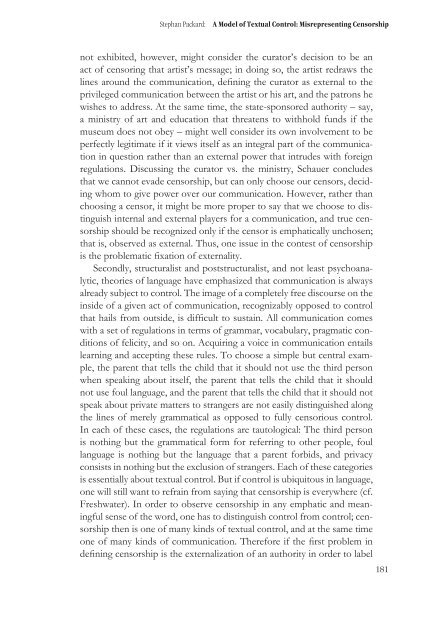Literatura in cenzura - Društvo za primerjalno književnost - ZRC SAZU
Literatura in cenzura - Društvo za primerjalno književnost - ZRC SAZU
Literatura in cenzura - Društvo za primerjalno književnost - ZRC SAZU
- No tags were found...
Create successful ePaper yourself
Turn your PDF publications into a flip-book with our unique Google optimized e-Paper software.
Stephan Packard:A Model of Textual Control: Misrepresent<strong>in</strong>g Censorshipnot exhibited, however, might consider the curator’s decision to be anact of censor<strong>in</strong>g that artist’s message; <strong>in</strong> do<strong>in</strong>g so, the artist redraws thel<strong>in</strong>es around the communication, def<strong>in</strong><strong>in</strong>g the curator as external to theprivileged communication between the artist or his art, and the patrons hewishes to address. At the same time, the state-sponsored authority – say,a m<strong>in</strong>istry of art and education that threatens to withhold funds if themuseum does not obey – might well consider its own <strong>in</strong>volvement to beperfectly legitimate if it views itself as an <strong>in</strong>tegral part of the communication<strong>in</strong> question rather than an external power that <strong>in</strong>trudes with foreignregulations. Discuss<strong>in</strong>g the curator vs. the m<strong>in</strong>istry, Schauer concludesthat we cannot evade censorship, but can only choose our censors, decid<strong>in</strong>gwhom to give power over our communication. However, rather thanchoos<strong>in</strong>g a censor, it might be more proper to say that we choose to dist<strong>in</strong>guish<strong>in</strong>ternal and external players for a communication, and true censorshipshould be recognized only if the censor is emphatically unchosen;that is, observed as external. Thus, one issue <strong>in</strong> the contest of censorshipis the problematic fixation of externality.Secondly, structuralist and poststructuralist, and not least psychoanalytic,theories of language have emphasized that communication is alwaysalready subject to control. The image of a completely free discourse on the<strong>in</strong>side of a given act of communication, recogni<strong>za</strong>bly opposed to controlthat hails from outside, is difficult to susta<strong>in</strong>. All communication comeswith a set of regulations <strong>in</strong> terms of grammar, vocabulary, pragmatic conditionsof felicity, and so on. Acquir<strong>in</strong>g a voice <strong>in</strong> communication entailslearn<strong>in</strong>g and accept<strong>in</strong>g these rules. To choose a simple but central example,the parent that tells the child that it should not use the third personwhen speak<strong>in</strong>g about itself, the parent that tells the child that it shouldnot use foul language, and the parent that tells the child that it should notspeak about private matters to strangers are not easily dist<strong>in</strong>guished alongthe l<strong>in</strong>es of merely grammatical as opposed to fully censorious control.In each of these cases, the regulations are tautological: The third personis noth<strong>in</strong>g but the grammatical form for referr<strong>in</strong>g to other people, foullanguage is noth<strong>in</strong>g but the language that a parent forbids, and privacyconsists <strong>in</strong> noth<strong>in</strong>g but the exclusion of strangers. Each of these categoriesis essentially about textual control. But if control is ubiquitous <strong>in</strong> language,one will still want to refra<strong>in</strong> from say<strong>in</strong>g that censorship is everywhere (cf.Freshwater). In order to observe censorship <strong>in</strong> any emphatic and mean<strong>in</strong>gfulsense of the word, one has to dist<strong>in</strong>guish control from control; censorshipthen is one of many k<strong>in</strong>ds of textual control, and at the same timeone of many k<strong>in</strong>ds of communication. Therefore if the first problem <strong>in</strong>def<strong>in</strong><strong>in</strong>g censorship is the externali<strong>za</strong>tion of an authority <strong>in</strong> order to label181
















